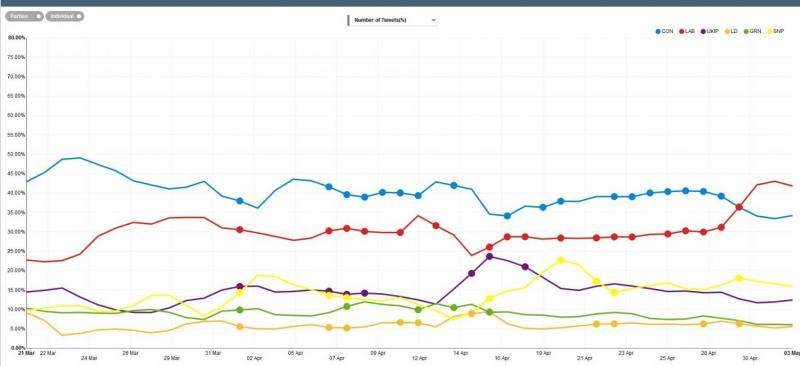Computer scientists use Twitter to predict UK general election result

Computer scientists from the University of Warwick are using Twitter to predict the outcome of the UK general election and believe their forecasts could be more accurate than traditional opinion polls.
They are working in collaboration with partners in the Department of Journalism at City University London and the Information Technologies Institute (ITI-CERTH, Greece).
Together, the team is using an algorithm that harvests political tweets, aggregates various features about every party and then injects this information into conventional polling reports, producing a daily prediction of voting share.
With the outcome of the general election in terms of seats more uncertain than ever, this approach will provide crucial insights into how public opinion is developing and what factors might be influencing any changes in support. Early results of the system have already tracked the surge in support for the SNP and the fluctuating fortunes of UKIP.
Details of the data produced so far, as well as commentary on the results and overview of the study, can be found here: www.electionprediction.eu.
Warwick researcher Adam Tsakalidis said: "We are trying to define and extract meaningful features out of the noisy, user-generated content published in Twitter. This includes the number of users mentioning a political party and the number of users who have expressed a negative opinion about this party on a certain day. We then put all this information into our forecasting model, along with the parties' share of the vote as measured by opinion polls. Predicting elections using social media data has been tried in the past, with varying results. We have evidence from our previous work that our approach is very effective."
Adam, who has developed the core of the prediction algorithm, improved the model and tested it again in the Greek election in January, achieving better results than all 31 most recent polls leading to the election, as well as the three exit polls that were announced once the ballots closed.
He added: "We have now adapted our model for the UK general election and we are in a position where we can make a daily prediction and identify trends in public support for each party. One of the key features we are incorporating in the model is the sentiment conveyed in the tweets. We are particularly interested in automatically identifying the sentiment expressed towards specific politicians or parties and topics such as immigration. This will help us obtain more accurate predictions as well as better understanding of the reasons behind public support or discontent."
City University's Professor Steve Schifferes added: "Social media is now central to how people consume election news. This ground-breaking research will give us deeper insights into how people are developing their own understanding of the election that goes beyond the traditional news media's agenda, and could enable us to spot early trends which could affect the overall outcome."
ITI-CERTH researcher Symeon Papadopoulos noted: "Although social media has already been used for some time as a means of discovering current trends and as a proxy of the interests and perceptions of the public, research has only recently started exploring its potential for predicting real-world outcomes such as the results of elections. To date, there is no reliable approach for achieving this. Yet, our approach, which has already been tested in a couple of recent elections with great success, carries the potential of creating the basis for such a solution for the problem of election prediction."
More information: The model being used was successfully applied in three different countries in the EU 2014 elections, as part of theSocialSensor research project.
Provided by University of Warwick




















